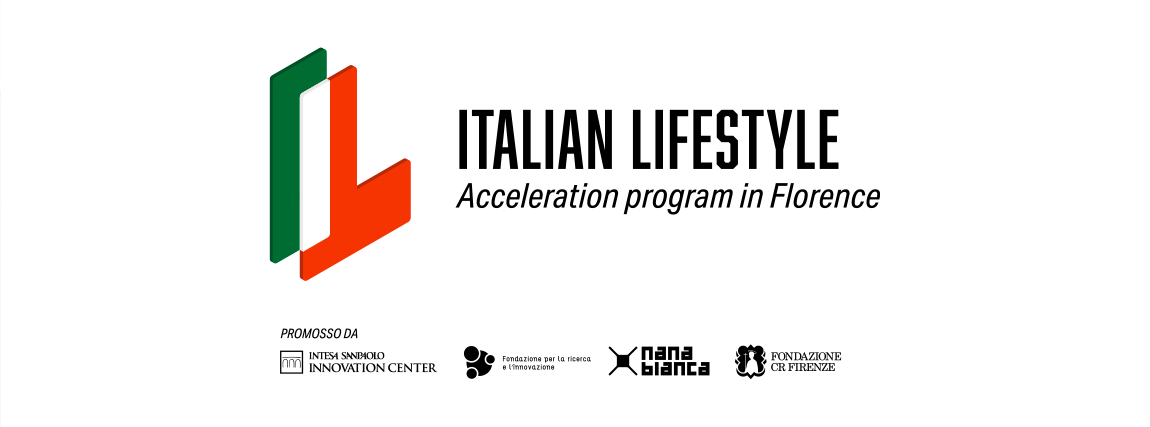Innovation and sustainability in the future of tourism, fashion and food & beverage Made In Italy
New technologies and digitalization for green and competitive Italian excellence with the contribution of Intesa Sanpaolo Innovation Center
“Made in Italy” is a brand comprising tradition, know-how, quality and creativity, as well as a synonym for excellence and, consequently, one of the brands most sought-after and sold on the international markets thanks to the excellent reputation enjoyed by Italian companies. Food & beverage, fashion and tourism are three of the sectors that best represent the Made in Italy label in the world, significantly contributing to the socio-economic growth of the country.


Technological innovation and digitization offer the opportunity to advance the Italian "know-how" by combining innovation and tradition, as well as giving greater visibility and relevance to our landscape and cultural heritage. However, the digital and technological transition also presents new challenges for the "Italian brand" wishing to remain a global excellence in a highly competitive context.
The contribution of the innovative Italian startups and SMEs is crucial for the evolution of three of the key sectors of the Made in Italy brand, in light of their ability to develop and place on the market enabling and transformative technologies to optimize and redefine the production processes that satisfy new consumer needs.
Thanks to open innovation, leading-edge companies with their forward-thinking “out of the box” technologies can break into the business silos and speed up the development and placing on the markets of innovative products and services.
"Made in Italy" food&beverage, fashion and tourism: what is their worth for the Italian economy
The Italian food & beverage sector consists of an articulated and fragmented supply chain that mirrors the Italian production system, comprising mainly SMEs (91% of micro-enterprises with fewer than 5 employees, a figure that rises to 99.4% if medium-sized ones are included). Overall, there are more than one million companies active in the sector, and these companies employ almost two million people.
Thanks to its highly specialized territories, the Italian food & beverage sector is able to offer a wide variety of high-quality products appreciated globally. Its export figures, which in 2022 exceeded 60 billion euros, are driven by seven segments: vegetables and vegetable preserves, wines, pasta and rice, dairy products, bakery products, animal preserves and chocolate.
Fashion - including the textile and accessories sector - is one of the main prides of the Italian industry. Considering the related sectors - such as luxury, beauty, footwear and jewellery - the supply chain is composed of almost 60.000 companies with around 600.000 employees. In 2022, after the pandemic emergency that negatively affected turnover and sales, thanks to its ability to combine creativity and quality with innovation, the sector had a turnover of over 96 billion euros, with exports exceeding 80 billion for a trade surplus estimated close to 30 billion euros.
Tourism - one of the sectors most affected by the pandemic - recorded 400 million visitors in Italy in 2022 with a substantial balance between Italian and foreign customers, which generated a revenue of 21.3 billion euros, bringing the country to fourth place on a global scale in terms of revenues coming from international tourism. According to ISTAT (Italian National Institute of Statistics) data, however, demand was down by 8.5% compared to 2019, with repercussions in terms of employment (of the 2 million pre-Covid employees, almost 90 thousand lost their job last year).


The main technological innovation trends for the evolution of Made in Italy in 2023
Food&beverage
In 2023 the Made in Italy food&beverage sector will continue to place environmental and social sustainability at the center of innovation. How? By progressively automating the production processes and making the supply chain increasingly circular and waste-free, thanks to new enabling technologies such as Artificial Intelligence and Cloud Computing: and at the same time by enhancing the local territories and their respective specificities, which have made the Italian food&beverage label a global excellence characterized by the variety and quality of its products.
In the circular transformation of the Made in Italy food&beverage sector already underway, along with addition waste reduction, it will also be crucial to rethink product packaging using recycled or biodegradable and innovative materials developed and manufactured primarily by startups.
IoT sensors will also be increasingly relevant for the sector, allowing companies to monitor the entire supply chain (for example the temperatures of cold rooms equipped with IoT sensors and 5G connectivity) and analyze in real time with Cloud Computing the huge amount of data available. Thus businesses can be steered towards a data-driven approach that maximizes profits by reducing costs and waste.
Furthermore, the use of Machine Learning and Artificial Intelligence can also bring advantages to the food & beverage sector. Machine Learning, for example, allows companies to maintain high quality levels by enabling faster and more efficient checks. To this end, AI is a valid aid due to its ability to detect problems and identify their causes in real time, so that businesses can improve their production processes.
In 2023, the fight against counterfeiting will continue to protect Made in Italy products. Among the technologies already used to defend against the phenomenon of “Italian sounding” - imitation also of the names of the food and wine excellences of the “Belpaese” - are Blockchain and QR Codes. With these technologies the entire life cycle of products can be traced, guaranteeing transparency and quality for consumers, and also responding to the growing need to have precise and detailed information to decide what to buy.


Fashion
In the Made in Italy fashion sector, the technological and digital innovation trends for 2023 are manifold and touch on different aspects of the production, distribution and consumption of clothing and accessories.
According to a United Nations report, the fashion industry is one of the most polluting activities and produces 8 to 10% of global CO2 emissions thanks to the spread of “fast fashion" which has led the EU to call for an end to it by 2030. As a result, the sector will continue to favor environmental, social and economic sustainability, adopting circular production processes and using innovative, recyclable or biodegradable materials.
With 3D technologies, for example, digital versions of products can be created thus reducing the waste of resources, such as water, in both printing and sampling. Without physical production, the carbon footprint drops dramatically.
Furthermore, Artificial Intelligence will predict consumer expectations by optimizing the entire supply chain. Virtual and augmented reality and metaverse will then allow consumers to virtually try clothes on, reducing the amount of returned items with a consequent reduction in textile waste generated by overproduction.
Mobile apps, on the other hand, will increasingly facilitate the purchase or resale of second-hand products, thus promoting environmental sustainability.
However, as the materials and textile fibers most used to produce clothing are the main source of pollution due to their slow environmental degradation, the development of alternative fabrics will be fundamental to the sustainable transition process of the sector.
The use of innovative fibers developed with materials such as cellulose, orange peels, ground coffee and leather obtained from mushrooms or apple peels, which is increasingly gaining ground even in luxury goods, goes in this direction. These types of fabric clearly generate less waste in the production phase: they are durable, biodegradable, reusable and recyclable. and, in most cases, they are the result of R&D by startups active in the sector.
Thanks to digitization, the fashion industry will exploit the potential offered by new technologies to respond to the changing needs of consumers, who will no longer be able to just buy products. The priority will become truly personalized, immersive and interactive omnichannel shopping experiences without interruption between real and digital environments.
After the "forced" push due to the pandemic, e-commerce and social networks will soon become the main purchasing channels, forcing sector operators to reconsifer the role of physical stores to reap the benefits offered by direct online sales without intermediaries.
Finally, just as in the food&beverage sector, the blockchain and the unique and dynamic QR codes will protect Made in Italy fashion products from counterfeiting.


Turism
In 2023, the technological innovation in the Italian tourism sector shows several relevant trends which on the one hand affect the offer, and on the other, the demand for products and services related to hospitality.
Digitization offers personalized, flexible and safe solutions to tourists by responding to the new travel habits that have emerged during the pandemic: proximity tourism, the ability of booking vacations ever closer to the date of travel and, no less relevant, the "workstation" (a mix of smart working and holidays).
On the one hand, as evidenced by the 2022 data, digital channels and the consequent possibility of booking, paying, accessing and using tourist services are now widely exploited to the detriment of travel agencies and tour operators who do not have online sales channels. On the other hand, tourism has become immersive and experiential, with repercussions both on the way people travel and on the "demand" for sustainability.
Indeed, after the pandemic travelers are no longer satisfied with experiencing unique and authentic emotions by immersing themselves in the culture and nature of the chosen destinations: they now want their experiences not to end with physical travel but to continue digitally in order to establish an ever deeper bond with the places already visited or to be visited.
In this sense, the availability of online contents represents an opportunity to create travel communities and to explore destinations in advance through virtual reality, augmented reality and the metaverse.
With respect to sustainability, the sector is increasingly adopting circular consumption and production practices, aimed at enhancing territories and the specificities of local communities. In order to pursue ESG goals, it will be crucial to de-seasonalize tourist flows and the consequent overcrowding, to focus on cultural attractiveness - which also includes food and wine, thanks to the many typical and different territory-specific Italian specialities -, and to exploit the lever of territorial marketing with digital channels to promote and make the lesser-known tourist destinations more “competitive” abroad.
Il ruolo di Intesa Sanpaolo Innovation Center per l’evoluzione e l’innovazione del Made in Italy
Intesa Sanpaolo Innovation Center - which supports the growth of the national economic system and its territories in order to aid companies in the growth and development of their business in accordance with the principles of open innovation and circular economy in an ecosystem where the supply meets the demand of innovation -is committed to further enhancing the Made in Italy brand and its evolution.
For instance, the portfolio of innovative startups and SMEs of the Intesa Sanpaolo Innovation Center includes companies that have developed innovative solutions in the three sectors of excellence of the Italy brand:
Berbrand. From the production of buttons for high fashion, it has expanded the business with packaging, finishing and costume jewelry and focused on eco-sustainability and waste reduction with more efficient and technologically advanced materials. It produces and markets Superlativa, a mother-of-pearl film that can be applied to any object, developed with an exclusive technology that eliminates processing waste.
WEL. Scale-up established in 2017 with the aim of digitizing processes in various areas thanks to the use of B-IoT technologies (blockchain and Internet of Things). Using localization in the hospitality sector, WEL aims to help companies create safer environments that can generate new experiences and new revenues, more efficient and on a human scale.
xFarm Technologies. Agritecht is a startup active in the digitization of various processes in the agri-food sector thanks to its app of the same name that offers administrative tools, suggestions based on agronomic algorithms and AI. It offers business intelligence solutions promoting production sustainability to food companies and OEM manufacturers who want to exploit agri-food big data as a source of economic value.


The second edition of the Italian Lifestyle Acceleration Program
The Intesa Sanpaolo Innovation Center’s connection with the local territories and support for SMEs and startups in the fields of Made in Italy fashion, tourism and food&beverage also consists of the Italian Lifestyle Acceleration Program, an acceleration program conceived and promoted together with Nana Bianca, CR Firenze Foundation and the Foundation for Research and Innovation.
Now in its second edition, the program - which was launched on March 14, 2023 - includes six selected innovative businesses that have developed transversal technologies for the technology transfer towards companies in the leading sectors of the economy in the metropolitan city of Florence. The first edition had promoted interesting prospects for collaboration between certain companies and the startups in the program.
Luca Pagetti, Head of Startup Growth Financing of Intesa Sanpaolo Innovation Center, in his speech during the launch of the second edition of the Italian Lifestyle Innovation program stated: “Innovation has no boundaries, one of the goals of the program is to bring selected businesses from Tuscany and elsewhere in Italy to contaminate local companies and bring ready-to-use solutions born of open innovation. We measure this accelerator with KPIs such as job creation and the attraction of businesses to the area, to ensure that startups really bring value to local companies and the area itself".
